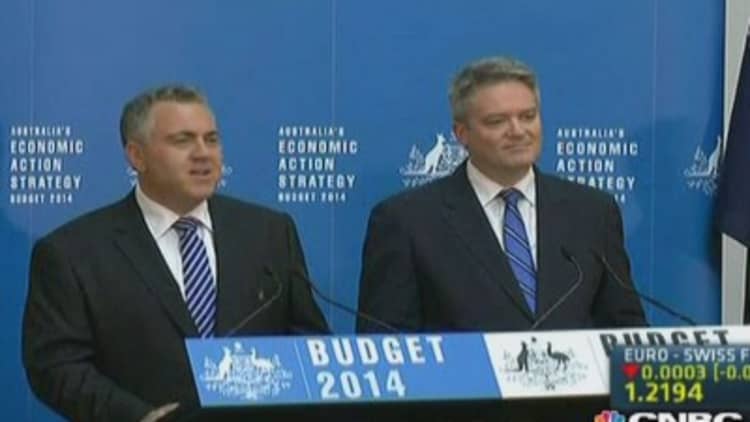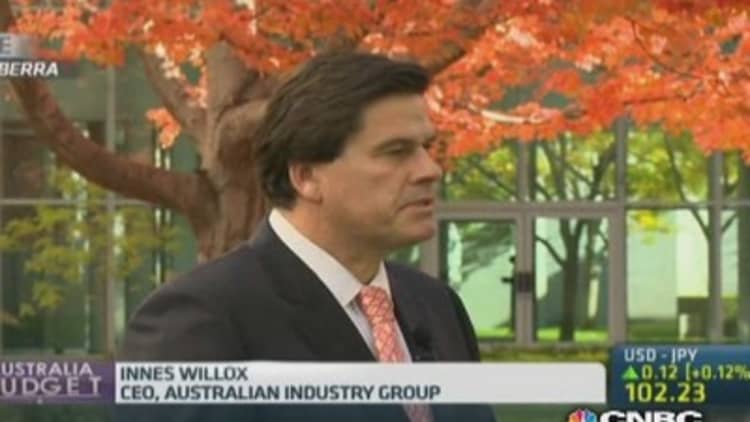
Australia's conservative government on Tuesday released a politically contentious federal budget packed with deregulation and tough spending cuts that it offers as a roadmap for returning to surplus within a decade.
The 2014/15 Federal Budget presents Prime Minister Tony Abbott and Treasurer Joe Hockey's blueprint for tackling what they call unsustainable deficits forecast at A$29.8 billion ($27.9 billion) next year and totalling A$60 billion over the next four years.
But the proposals would signal perhaps the most radical reshaping of Australia's social safety network in its modern history through broad structural reforms to the welfare, healthcare, higher education and pension systems.
And with 16,500 public sector employees set to lose their jobs, the rolling back of universal healthcare and deregulation of university fees, rises to the pension age and fresh income tax hikes, it could prove politically perilous.
Read MoreBudget day in Australia: here comes a tax hike
"We know that for some in the community, this budget will not be easy. But this budget is not about self interest. This budget is about the national interest," Treasurer Joe Hockey said in his Budget Speech.
"Doing nothing is not an option. The days of borrow and spend must come to an end."
What debt crisis?
Australia has fared better than most developed nations in the past decade, having avoided the implosions of the finance and housing sectors seen in the United States and Europe, while Chinese demand for resources fueled a boom in its terms of trade.
But having gone into the 2008 global financial crisis with virtually no debt, latest projections show Australian deficits continuing, with net debt set to rise to 14.6 percent of GDP by 2016/17, the highest in about 20 years.
Still, Australia's debt pales in comparison to most developed nations, spurring criticism that many of the mooted measures are unnecessary and might damage the AAA-rated economy.

Government debt in the United States and euro zone account for more than 100 percent of GDP, according to OECD figures.
While Australia's problems may be the envy of many of its rich-world peers, the government argues that 22 years of unbroken economic growth has been squandered on a bloated bureaucracy and tax breaks for the wealthy rather than investing in infrastructure now so badly needed in many regions.
The budget forecasts deficits to shrink to A$2.8 billion or 0.2 percent of GDP by 2017/18, which if accomplished would indeed represent a radical shrinking of the deficit from almost A$50 billion in the current year.
An end to the age of entitlement
Abbott campaigned on ending "the age of entitlement" that he argues has created an unsustainable spending path that would leave Australia vulnerable to external shocks from top trading partner China, for example, and to structural changes such as an aging population.
Among the widely flagged proposals, Australia's pension age will rise to 70 by 2035 and eligibility for pensions and other welfare payments will also be tightened.
On healthcare, a A$7 fee for all doctor's visits will be introduced from July of next year, while at the same time decreasing government subsidies for prescription medications.
Read MoreSwan to Hockey: Stop talking down Australia's economy
Those savings will be invested in a A$20 billion Medical Research Future Fund, which the government says will be the largest such program in the world within a decade.
The changes mark the biggest shift since the introduction of universal healthcare and puts Australia in the unusual position of moving away from universal coverage even as the rest of the world, including the United States, has moved to provide it.
Students will also be facing big changes from January 2016, as government caps on tuition fees for higher education will be removed while the average government contribution towards course fees will be slashed by about 20 percent.
Although the healthcare measures will primarily be felt by low income Australians, the budget is asking the wealthy to contribute through a 2 percentage point tax rate hike on earnings of over A$180,000 per year for three years.
At the same time as the government is asking taxpayers to shoulder more of the burden, the budget committed to a previously flagged 1.5 percentage point cut in the corporate tax rate and unveiled an A$11 billion infrastructure package sure to please business.
While the government has a clear majority in the House of Representatives, the upper house Senate could yet provide significant hurdles to more contentious issues including the repeal of carbon and mining taxes, welfare cuts and the temporary deficit levy.

